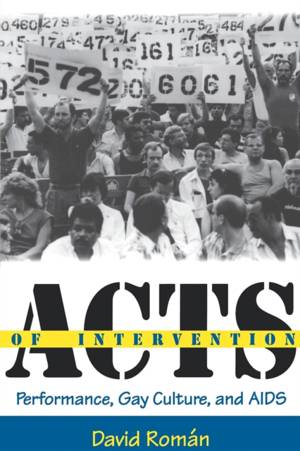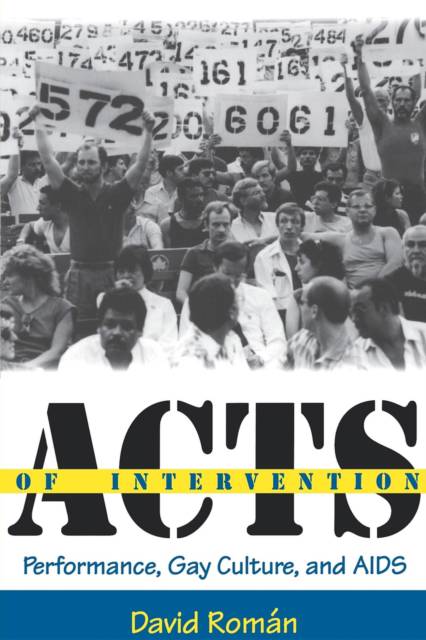
- Retrait gratuit dans votre magasin Club
- 7.000.000 titres dans notre catalogue
- Payer en toute sécurité
- Toujours un magasin près de chez vous
- Retrait gratuit dans votre magasin Club
- 7.000.0000 titres dans notre catalogue
- Payer en toute sécurité
- Toujours un magasin près de chez vous
Description
Acts of Intervention examines the ways that gay men have used theatre and performance to intervene in the AIDS crisis. It discusses dramatic texts and public performances--from cabarets and candlelight vigils to full-scale Broadway productions such as Angels in America and Rent--that have shaped, and been shaped by, the history of AIDS in national, regional, and local contexts. Román examines mainstream as well as alternative and activist forms of theatre, including solo performance, community-based projects, mixed-media events, activist demonstrations, and AIDS educational theatre initiatives.
Acts of Intervention traces the ways in which performance and theater have participated in and informed the larger cultural politics of race, sexuality, citizenship, and AIDS in the United States during the last fifteen years. The book discusses not only how the theater has provided a forum for gay male response to the epidemic but also the degree to which those responses have in turn shaped the ideological formulation of AIDS. Román offers a new method for mapping the relation between AIDS and representation by combining interpretive strategies from performance theory, gay and lesbian studies, critical race discourse, and cultural studies.
This book is dedicated to writing the history of theatrical interventions in the AIDS epidemic, including performances whose official history has been largely neglected or forgotten. Because many early performances about AIDS left little or no documentation, the task of constructing an AIDS theatre historiography confronts immediate problems and limitations.
Acts of Intervention argues that the history of AIDS performance is located at the juncture of memory and disappearance, of mourning and survival, of representation and its impossibility in the context of epidemic loss.
Spécifications
Parties prenantes
- Auteur(s) :
- Editeur:
Contenu
- Nombre de pages :
- 384
- Langue:
- Anglais
- Collection :
Caractéristiques
- EAN:
- 9780253211682
- Date de parution :
- 22-02-98
- Format:
- Livre broché
- Format numérique:
- Trade paperback (VS)
- Dimensions :
- 155 mm x 231 mm
- Poids :
- 521 g

Les avis
Nous publions uniquement les avis qui respectent les conditions requises. Consultez nos conditions pour les avis.






